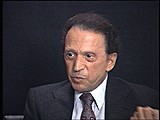You searched for: 数字货币游戏,加密货币游戏,数字币游戏,usd博彩游戏,【www.2266.com,复制打开网址】,used泰达币博彩网站,区块链游戏排名,区块链游戏nft,区块链游戏平台,nft游戏有哪些,nft是什么游戏,以太坊游戏,区块链游戏赚钱网站,币圈游戏,区块链博彩平台,网址kaefhfkccdckbghcd
<< Previous | Displaying results 1701-1710 of 1782 for "数字货币游戏,加密货币游戏,数字币游戏,usd博彩游戏,【www.2266.com,复制打开网址】,used泰达币博彩网站,区块链游戏排名,区块链游戏nft,区块链游戏平台,nft游戏有哪些,nft是什么游戏,以太坊游戏,区块链游戏赚钱网站,币圈游戏,区块链博彩平台,网址kaefhfkccdckbghcd" | Next >>
-
Felix Horn describes antisemitism in Lvov and conditions in the Janowska camp
Oral HistoryFelix was born to an assimilated Jewish family in Lublin, Poland. His father was a locksmith and his mother was a singer. Following the German invasion of Poland on September 1, 1939, Felix fled east to Rovno and then to Soviet-occupied Lvov, where he was accepted at a medical school. After the German invasion of the Soviet Union in June 1941, Felix was taken to a labor camp. He escaped and returned to Lublin, and found that his family had been forced into the ghetto established there. After the…
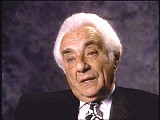
-
Wilek (William) Loew describes the hiding place in which his mother survived an Aktion in Lvov
Oral HistoryWilek was the son of Jewish parents living in the southeastern Polish town of Lvov. His family owned and operated a winery that had been in family hands since 1870. Wilek's father died of a heart attack in 1929. Wilek entered secondary school in 1939. Soon after he began school, World War II began with the German invasion of Poland. Lvov was in the part of eastern Poland annexed by the Soviet Union. Although the Soviets took over Wilek's home and the family business, Wilek was able to continue his…
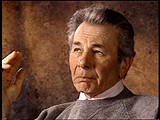
-
Lucine Horn describes conditions in the Lublin ghetto
Oral HistoryLucine was born to a Jewish family in Lublin. Her father was a court interpreter and her mother was a dentist. War began with the German invasion of Poland on September 1, 1939. Lucine's home was raided by German forces shortly thereafter. Soon after the German occupation of Lublin, Jews there were forced to wear a compulsory badge identifying them as Jews. A ghetto in Lublin was closed off in January 1942. Lucine survived a series of killing campaigns and deportations from the ghetto during March and…
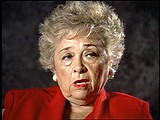
-
Israel Ipson describes forced labor to construct an airplane runway
Oral HistoryIsrael was raised in Kovno, Lithuania, and graduated from law school there in 1933. Because of anti-Jewish discrimination, he was unable to practice law. The Germans invaded the Soviet Union in June 1941, occupying Lithuania. The Kovno ghetto was established that August. By claiming to be a mechanic, Israel escaped several massacres. He was forced to work on a wooden airport runway outside the ghetto. After he escaped, Israel, his wife, and son hid in a potato pit for 9 months until liberation by Soviet…
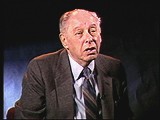
-
Barbara Ledermann Rodbell describes receiving her first set of false papers
Oral HistoryIn 1933 Barbara's family moved to Amsterdam, in the Netherlands. They became friends of Anne Frank and her family. The Germans invaded the Netherlands in 1940. Barbara's boyfriend, Manfred, had underground contacts and she got false papers. Her mother, sister, and father were deported to Westerbork and then to Auschwitz. Barbara survived using her false papers and worked for the resistance. She helped take Jews to hiding places and also hid Jews in an apartment held in her false name.
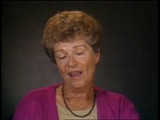
-
Tina Strobos describes her courier duties for the underground in the Netherlands
Oral HistoryTina was a medical student when the Germans invaded the Netherlands in May 1940. She and members of her sorority joined the underground, and she hid Jews in her house from the beginning of the war. Tina found hiding places for Jewish children, forged passports, and served as a courier for the underground.
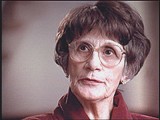
-
David (Dudi) Bergman describes being rescued by inmates before he could be taken to the Dachau crematorium
Oral HistoryThe Germans occupied David's town, previously annexed by Hungary, in 1944. David was deported to Auschwitz and, with his father, transported to Plaszow. David was sent to the Gross-Rosen camp and to Reichenbach. He was then among three of 150 in a cattle car who survived transportation to Dachau. He was liberated after a death march from Innsbruck toward the front line of combat between US and German troops.
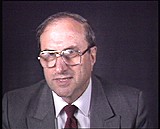
-
Chaim Engel describes his role in the Sobibor uprising
Oral HistoryIn 1939, as Chaim's tour in the Polish army was nearing its scheduled end, Germany invaded Poland. The Germans captured Chaim and sent him to Germany for forced labor. As a Jewish prisoner of war, Chaim later was returned to Poland. Ultimately, he was deported to the Sobibor camp, where the rest of his family died. In the 1943 Sobibor uprising, Chaim killed a guard. He escaped with his girlfriend, Selma, whom he later married. A farmer hid them until liberation by Soviet forces in June 1944.
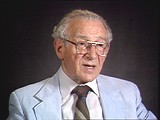
-
Colonel Richard R. Seibel describes food distribution after liberation of the Mauthausen camp
Oral HistoryIn June 1941, Richard was ordered to active duty in the US Army. After a period of training, he was sent to Europe. He entered Austria in April 1945. A patrol came upon the Mauthausen camp and Richard was appointed to take command of the camp. He organized those inmates who had survived in the camp until liberation in May 1945, and brought in two field hospitals. After 35 days in Mauthausen, he was transferred to a post in the Austrian Alps.
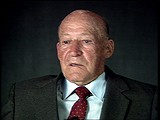
-
Sandor (Shony) Alex Braun describes playing the violin for SS guards in Dachau. after two prisoners before him had been killed
Oral HistoryShony was born to religious Jewish parents in a small Transylvanian city. He began to learn the violin at age 5. His town was occupied by Hungary in 1940 and by Germany in 1944. In May 1944, he was deported to the Auschwitz camp in Poland. He was transferred to the Natzweiler camp system in France and then to Dachau, where he was liberated by US troops in April 1945. In 1950, he immigrated to the United States, and became a composer and a professional violinist.
